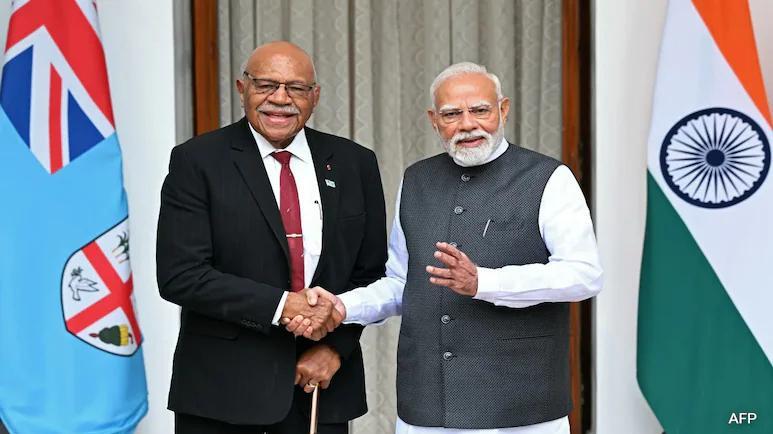
Somebody is not very happy with you: Fiji PM to PM Modi after US’ 50% tariff
In a candid conversation with Indian Prime Minister Narendra Modi, Fiji’s Prime Minister Sitiveni Ligamamada Rabuka made some pointed remarks regarding the recent 50% tariff imposed by the United States on India. The comments, made during Rabuka’s recent 3-day visit to India, have sparked both interest and curiosity among observers, who are eager to know more about the tone and tenor of the meeting between the two leaders.
According to reports, Rabuka conveyed to PM Modi that “somebody is not very happy with you,” seeming to hint at the United States’ decision to impose the hefty tariff. However, he also added a reassuring phrase, saying, “But then you are big enough to weather those discomforts.” This statement, while seemingly paradoxical, may be seen as a reflection of Rabuka’s diplomatic finesse, as he attempted to balance his concerns with a message of reassurance and confidence.
The comments, made public through a news report by NDTV, have sparked widespread interest in the diplomatic circles, with many trying to decipher the underlying meaning and implications of Rabuka’s words. While it is unclear what specific factors led Rabuka to make these remarks, it is possible that he was attempting to convey a message of caution and preparedness, urging PM Modi to be aware of the potential consequences of the US tariff and to take necessary steps to mitigate them.
In the context of the ongoing tariff dispute, Rabuka’s comments may be seen as a nod to the challenges that India faces in navigating its complex relationship with the United States. The 50% tariff, imposed by the US in response to India’s alleged failure to provide sufficient access to its markets, has been widely criticized as a punitive measure that will harm Indian exports and hurt domestic industries.
India, for its part, has maintained that it has fulfilled its obligations under international trade agreements and that the tariff is unfair and protectionist. The Indian government has also taken steps to retaliate against the US tariff, imposing its own set of duties on certain American products, including almonds, apples, and walnuts.
Against this backdrop, Rabuka’s comments may be seen as a warning to PM Modi to be prepared for the potential fallout of the tariff dispute. By highlighting the need for India to “weather those discomforts,” Rabuka may be urging PM Modi to take a proactive approach to managing the crisis, rather than simply reacting to the US tariff.
Moreover, Rabuka’s statement may also be seen as a reflection of the complex diplomatic dynamics at play in the Indo-Pacific region. Fiji, a small island nation with close ties to India, is a member of the Pacific Islands Forum, which has been critical of the US tariff and its potential impact on the region.
By making these remarks, Rabuka may be signaling to PM Modi that Fiji is solidly behind India in its efforts to resolve the tariff dispute and that the two countries share a common interest in promoting fair and balanced trade practices.
In conclusion, Rabuka’s comments to PM Modi, while seemingly innocuous on the surface, may be seen as a significant development in the ongoing tariff dispute between the US and India. By conveying a message of caution and preparedness, Rabuka may be urging PM Modi to take a proactive approach to managing the crisis and to prioritize the interests of Indian industries and exporters.
As the situation continues to unfold, it will be interesting to see how PM Modi responds to Rabuka’s remarks and whether he takes any concrete steps to address the concerns raised by the Fijian Prime Minister. One thing is certain, however – the comments have sparked a lively debate about the implications of the US tariff and the need for India to navigate its complex relationship with the United States with caution and diplomacy.



